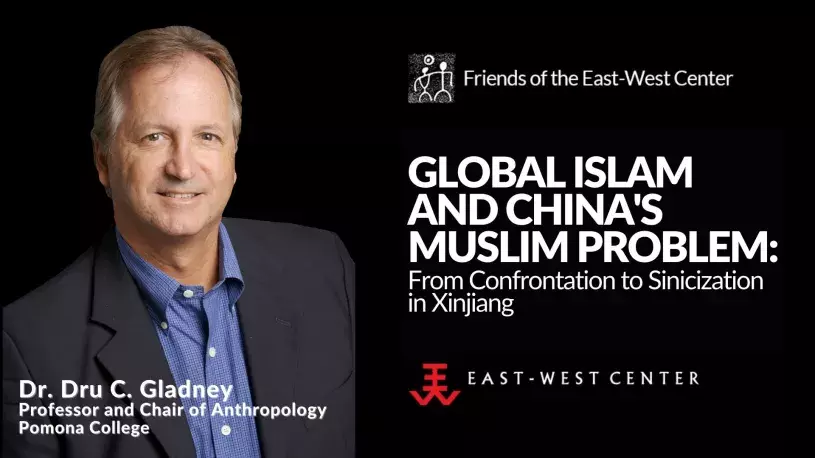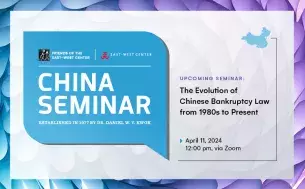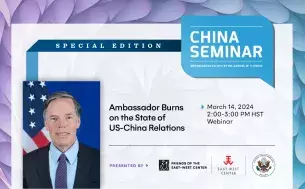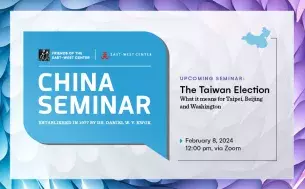Error message

Global Islam and China's Muslim Problem: From Confrontation to Sinicization in Xinjiang
featuring
Dr. Dru Gladney
Professor of Anthropology, Pomona College
This talk examines the rise of the “Xinjiang Problem” in Sino-US relations and the recent events involving the Uyghur in China’s Northwest Region. Some have suggested that China has already engaged in a “genocide” in Xinjiang as early as the July 5, 2009 riots in Urumqi. While the state media attribute the Uyghur activism to radical Islam and separatism, none of the protestors have called for jihad or an independent “Eastern Turkistan,” and the former US Secretary of State Michael Pompeo on his last day in office formally listed the treatment of the Uyghur as “genocide.” President Biden’s administration has not backed away from this designation. Internationally, the Uyghur diaspora helped to call global attention to the “education camps” that Chinese media initially denied, then attempted to re-shape as “vocational centers” through carefully edited reporting and selective coverage. This talk suggests that President Xi Jinping’s “Belt and Road Initiative” lies behind China’s increasingly severe treatment of the Uyghur, and sets the harsh policy shift in the context of rising co-dependency between China and the Middle East due to heightened energy and security concerns.
Dr. Dru Gladney is Professor and Chair of Anthropology at Pomona College in Claremont, California and recent President of the Pacific Basin Institute.
In addition to a Ph.D. in Social Anthropology from the University of Washington, Seattle, Dr. Gladney has three M.A. degrees in religion, philosophy, and anthropology. He has also held faculty positions and post-doctoral fellowships at Cambridge University, Harvard University, China Minzu University, Shanghai University for Politics and Law, the University of Southern California, the University of Hawai’i and the Institute for Advanced Study, Princeton. He has authored or edited 6 books and over 100 academic articles, as well as having served as a Senior Fellow at the East-West Center and the inaugural Dean of the Asia-Pacific Center for Security Studies. Dr. Gladney’s father, Capt. Benjamin Curtis Gladney, served as a pilot during WWII in the China-Burma-India theatre, successfully completing 60 missions flying the infamous “Hump” air route between Assam, India and Southwest China.
The China Seminar was founded by Dr. Daniel W.Y. Kwok 44 years ago. Under his guidance, it became a signature program of the Friends of the East-West Center (FEWC) in 2009. The program provides an informal venue for China experts, such as scholars, diplomats, and journalists, to present talks on aspects of China that interest the community and members of the Friends. Topics include politics, economics, social issues, history, culture, food, arts, and many other subjects. Though Dr. Kwok has recently retired from his involvement with the program, the FEWC and the East-West Center remain committed to continuing this important program.
To register for this event, please visit www.FriendsofEWC.org
Global Islam and China's Muslim Problem: From Confrontation to Sinicization in Xinjiang
featuring
Dr. Dru Gladney
Professor of Anthropology, Pomona College
This talk examines the rise of the “Xinjiang Problem” in Sino-US relations and the recent events involving the Uyghur in China’s Northwest Region. Some have suggested that China has already engaged in a “genocide” in Xinjiang as early as the July 5, 2009 riots in Urumqi. While the state media attribute the Uyghur activism to radical Islam and separatism, none of the protestors have called for jihad or an independent “Eastern Turkistan,” and the former US Secretary of State Michael Pompeo on his last day in office formally listed the treatment of the Uyghur as “genocide.” President Biden’s administration has not backed away from this designation. Internationally, the Uyghur diaspora helped to call global attention to the “education camps” that Chinese media initially denied, then attempted to re-shape as “vocational centers” through carefully edited reporting and selective coverage. This talk suggests that President Xi Jinping’s “Belt and Road Initiative” lies behind China’s increasingly severe treatment of the Uyghur, and sets the harsh policy shift in the context of rising co-dependency between China and the Middle East due to heightened energy and security concerns.
Dr. Dru Gladney is Professor and Chair of Anthropology at Pomona College in Claremont, California and recent President of the Pacific Basin Institute.
In addition to a Ph.D. in Social Anthropology from the University of Washington, Seattle, Dr. Gladney has three M.A. degrees in religion, philosophy, and anthropology. He has also held faculty positions and post-doctoral fellowships at Cambridge University, Harvard University, China Minzu University, Shanghai University for Politics and Law, the University of Southern California, the University of Hawai’i and the Institute for Advanced Study, Princeton. He has authored or edited 6 books and over 100 academic articles, as well as having served as a Senior Fellow at the East-West Center and the inaugural Dean of the Asia-Pacific Center for Security Studies. Dr. Gladney’s father, Capt. Benjamin Curtis Gladney, served as a pilot during WWII in the China-Burma-India theatre, successfully completing 60 missions flying the infamous “Hump” air route between Assam, India and Southwest China.
The China Seminar was founded by Dr. Daniel W.Y. Kwok 44 years ago. Under his guidance, it became a signature program of the Friends of the East-West Center (FEWC) in 2009. The program provides an informal venue for China experts, such as scholars, diplomats, and journalists, to present talks on aspects of China that interest the community and members of the Friends. Topics include politics, economics, social issues, history, culture, food, arts, and many other subjects. Though Dr. Kwok has recently retired from his involvement with the program, the FEWC and the East-West Center remain committed to continuing this important program.
To register for this event, please visit www.FriendsofEWC.org
China Seminars
The China Seminar was established by Dr. Daniel W.Y. Kwok in 1977. Under his guidance, it became a signature program of the Friends of the East-West Center (FEWC) in 2009. The program provides an informal venue for China experts, such as scholars, diplomats, and journalists, to present talks on aspects of China that interest the community and members of the Friends.









